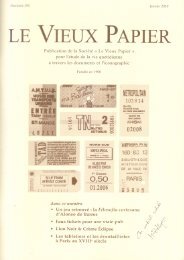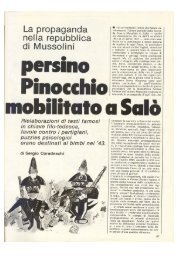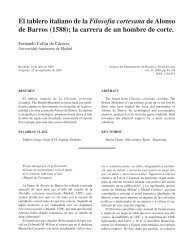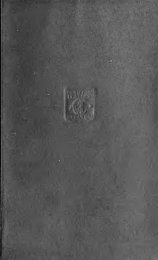Board games from the city of Vijayanagara (Hampi ... - Gioco dell'Oca.
Board games from the city of Vijayanagara (Hampi ... - Gioco dell'Oca.
Board games from the city of Vijayanagara (Hampi ... - Gioco dell'Oca.
You also want an ePaper? Increase the reach of your titles
YUMPU automatically turns print PDFs into web optimized ePapers that Google loves.
Hawalis in Oman: a first account <strong>of</strong> expertise<br />
and dispersal <strong>of</strong> four-row mancala in<br />
<strong>the</strong> Middle East / Alexander J. de Voogt<br />
Townshend (1979) hinged his <strong>the</strong>ory <strong>of</strong> <strong>the</strong> African origin <strong>of</strong> mancala on <strong>the</strong> available<br />
descriptions <strong>of</strong> Arab and Asian mancala <strong>games</strong>. These descriptions showed<br />
little diversity for Asian <strong>games</strong> and hardly any examples <strong>of</strong> mancala in <strong>the</strong> Middle<br />
East. The diversity <strong>of</strong> rules in Africa and <strong>the</strong> absence <strong>of</strong> four-row mancala <strong>games</strong> outside<br />
<strong>of</strong> East Africa convinced Townshend to locate <strong>the</strong> origin <strong>of</strong> mancala in Africa.<br />
Since 1979 much research in Asia has been conducted and our knowledge <strong>of</strong> <strong>the</strong><br />
diversity <strong>of</strong> Asian mancala rules has increased significantly. One four-row game has been<br />
reported in Yunnan Province, China, although this did not indicate that four-row <strong>games</strong><br />
have originated in China (Eagle 1995). Information <strong>from</strong> Oman, Roman Asia Minor<br />
and o<strong>the</strong>r Arab countries indicates that perhaps research should start focusing on <strong>the</strong><br />
Middle East.<br />
Museum research has provided examples <strong>of</strong> game boards <strong>from</strong> Syria in <strong>the</strong> British<br />
Museum (de Voogt 1997:20, 76-77), Egypt in <strong>the</strong> Tropenmuseum, Amsterdam (de<br />
Voogt & Donkers 2002) and Palestine in <strong>the</strong> University <strong>of</strong> Pennsylvania Museum (de<br />
Voogt 2001:45). They are all two-row mancala <strong>games</strong> and <strong>the</strong> Egyptian variations show<br />
many different mancala rules in <strong>the</strong> descriptions provided in <strong>the</strong> literature (Murray 1952,<br />
Deledicq & Popova 1977) and in <strong>the</strong> notes left by collectors.<br />
Hawalis rules<br />
The mancala game played in Oman consists <strong>of</strong> four rows <strong>of</strong> seven holes. Each hole<br />
contains two counters, commonly white stones or pebbles. With each turn <strong>the</strong> contents<br />
<strong>of</strong> a hole with more than one stone is pick up and spread one-by-one in counter-clockwise<br />
direction. The players play in <strong>the</strong> two rows at <strong>the</strong>ir side. When <strong>the</strong> last counter<br />
enters an occupied hole, <strong>the</strong> contents <strong>of</strong> this hole is picked up and spread in <strong>the</strong> same<br />
way and direction. When <strong>the</strong> last counter enters an empty hole <strong>the</strong> move ends, unless it<br />
enters an empty hole on <strong>the</strong> front row in which case it is possible to capture.<br />
If <strong>the</strong> holes directly opposite this last counter, i.e. one hole in <strong>the</strong> front row and one<br />
hole in <strong>the</strong> back row <strong>of</strong> <strong>the</strong> opponent, contain at least one counter each, <strong>the</strong> contents <strong>of</strong><br />
both holes are captured and taken <strong>from</strong> <strong>the</strong> board. If <strong>the</strong> front hole is empty, no capture<br />
is made, but if <strong>the</strong> hole in <strong>the</strong> back row <strong>of</strong> <strong>the</strong> opponent is empty, it is still possible to<br />
capture <strong>the</strong> counters in <strong>the</strong> front hole.<br />
The player who has lost all <strong>the</strong> pieces has also lost <strong>the</strong> game. If a player plays an endless<br />
move, this player has lost as well.<br />
One is not allowed to play singletons, i.e. holes containing only one counter. Only<br />
when all <strong>the</strong> holes <strong>of</strong> <strong>the</strong> player contain less than two counters is <strong>the</strong> player allowed to<br />
play singletons. In that case, <strong>the</strong> single counters are not allowed to double up, i.e. <strong>the</strong>y<br />
may not enter a hole already containing one counter. When it enters an empty hole in







